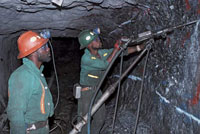South Africa's mining union to stage strike to increase safety
The National Union of Mineworkers, concerned about safety in a country where a miner dies nearly every day, is planning to organize a strike to increase pressure on South Africa's mining industry.

The world's leading producers of gold and platinum are among mines to be hit by the one-day strike called by the 270,000-member National Union of Mineworkers. The union also said it expects some 40,000 members to turn out for a march in Johannesburg on the Chamber of Mines, the industry employer's organization that includes leaders AngloGold Ashanti, Gold Fields, Harmony Gold, Anglo Platinum, Impala Platinum and Lonmin.
Chamber officials did not comment on the eve of the strike, other than to refer to a joint statement released after a meeting last week between the chamber and NUM in which it was agreed the protest strike would be on a "no work, no pay basis." The statement acknowledged "there is much to be done to drastically reduce the number of accidents and fatalities on the mines."
Union spokesman Lesiba Seshoka said: "We've had a lot of commitment from them, but (improved safety measures) haven't been implemented. We felt they needed a bit of a push."
The problems, compounded by the country having the deepest mines in the world, often are seen as a hangover from the former white apartheid regime, which was seen as unconcerned about the safety, poor pay and dire living conditions of black miners. Fourteen years after the end of white rule, miners continue to be the poorest paid in the industrial sector.
"Our safety records both as a company and as a country leave much to be desired," Patrice Motsepe, one of a new breed of black mine owners, said. He spoke in October when 3,200 of his Harmony Gold miners were trapped more than a mile underground for two days after a pressurized air pipe exploded.
The miners escaped unscathed, but the accident brought international attention to South Africa's mine safety issues. The mining union said the Harmony miners should have been able to get out through a secondary exit, but that mine owners long had ignored their calls for all shafts to have two exits.
President Thabo Mbeki ordered an audit of all mines. It was not known how long that could take South Africa has a shortage of safety inspectors.
Minerals and Energy Minister Buyelwa Sonjica said "drastic measures" were being taken to ensure safety rules were followed. She spoke in a week when the government shut down at least 50 mines because of unsafe working conditions.
The union's Seshoka said public prosecutors have failed to act on recommendations that some mine managers be prosecuted for negligence. The chief inspector of mines, Thabo Gazi, spoke of "few if any" prosecutions. Minerals and Energy director general Sandile Nogxina said that could change.
"We are now going to strengthen the enforcement measures," he said.
South Africa's Business Day newspaper, in an opinion piece, said mine supervisors "remain hostile to the introduction of new (safety) values into a traditionally conservative environment."
"The mines are worse than battlefields," said Solidarity, a small independent union. "It is a pity that so many people had to die before role players acknowledged the gravity of the problem."
As of the end of September, some 226 miners had been killed on the job, the mineworkers' union said, compared to 199 in all of 2006. The number of fatalities had been dropping, from nearly 900 in 1987 to about 500 in 1997, according to mines inspector Gazi.
The strike could affect the bottom line for mining companies already reporting losses as depleted resources force them to dig ever deeper at greater cost.
When a worker was killed by a falling rock at Anglo Platinum's Paardekraal shaft, the largest platinum mine in the world, the company said the shutdown was losing it 1,300 ounces of refined platinum a day in October. The eight-day closure sent platinum prices to an all-time high of US$1,454 an ounce.
The strike over safety follows one for higher pay. With global minerals prices on the rise, miners won raises of up to 10 percent this year, but the average miner still earns about R3,500 (US$500; Ђ300) a month.
Subscribe to Pravda.Ru Telegram channel, Facebook, RSS!


